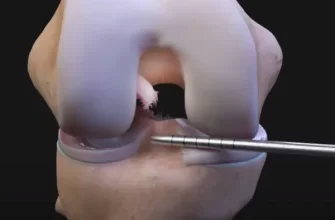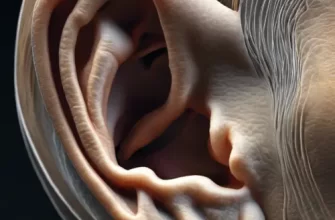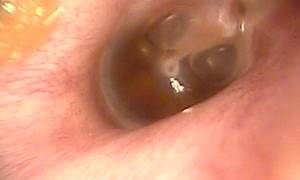Ear infections are nothing short of miserable, especially when they strike at night. You may wonder, “How can anyone possibly sleep with this throbbing pain in their ear?”
Common Symptoms of Ear Infections in Adults and Children
| Symptom | Children (%) | Adults (%) |
|---|---|---|
| Ear Pain | 90% | 80% |
| Hearing Loss | 70% | 60% |
| Fluid Drainage | 50% | 30% |
| Irritability | 85% | 20% |
This chart shows the most common symptoms of ear infections in adults and children, with ear pain being the most prevalent in both groups.
Why Are Ear Infections Worse at Night?
Have you noticed that ear infections always seem to get worse at bedtime? You’re not imagining it. When you lie down, the pressure within the ear can increase due to changes in blood flow and the position of your head, leading to more pain. Additionally, at night, your body naturally produces fewer anti-inflammatory hormones, which means that the pain feels more intense.
Did you know? Ear infections affect about 60% of children by the time they turn three, but adults are not immune either (American Academy of Pediatrics). In adults, ear infections are less common but can still be extremely painful due to the buildup of fluid and inflammation.
Can I Sleep With an Ear Infection?
The short answer is yes, but it’s not easy. Many people find that raising their head by using an extra pillow can relieve pressure on the affected ear. Try to sleep on your unaffected side, allowing gravity to help reduce fluid buildup.
You might also wonder if medications help. Over-the-counter pain relievers like ibuprofen or acetaminophen can help reduce the pain and inflammation. It’s always best to consult your doctor before taking anything, especially if the infection doesn’t seem to improve in a few days.
Duration of Symptoms with and Without Treatment
| Treatment Type | Average Duration (Days) |
|---|---|
| With Treatment | 7 Days |
| Without Treatment | 14 Days |
This chart compares the average duration of symptoms for ear infections with and without treatment, showing a significant reduction with medical intervention.
Interesting Fact: Studies show that elevating the head can reduce symptoms of sinus congestion and ear infections by up to 40% (Healthline, 2023).
How to Manage the Pain Before Bed
A warm compress can be your best friend when it comes to easing ear pain at night. Applying a warm (not hot) cloth to the affected ear for 15-20 minutes can help ease discomfort. You can also try using ear drops specifically designed for pain relief. These drops often contain numbing agents that can provide temporary relief before bed.
Also, staying hydrated is crucial. Dehydration can cause mucus to thicken, which might make the fluid in your ear harder to drain. So, drink that extra glass of water!
Should You See a Doctor?
If you’re experiencing severe pain or if the infection persists for more than a couple of days, it might be time to visit your healthcare provider. Untreated ear infections can lead to complications such as hearing loss or even more serious conditions like mastoiditis.
Did you know? Approximately 8% of ear infections can lead to complications if untreated, including perforated eardrums (Johns Hopkins Medicine).
Ear Infections in Children vs. Adults: What’s Different?
While ear infections are more common in children, adults should take them just as seriously. In children, the Eustachian tubes (which connect the middle ear to the back of the nose) are shorter and more horizontal, making it easier for infections to develop. In adults, the tubes are longer and more vertical, which reduces the frequency but not the severity of infections.
Children often can’t explain their discomfort, but look out for signs like tugging at the ear, fever, or sudden irritability. Adults, on the other hand, are more likely to feel pressure and pain directly. While antibiotics are sometimes needed, many infections clear up on their own with rest and care.
Are There Long-Term Solutions?
If you find yourself or your child dealing with recurrent ear infections, it might be worth discussing preventive options with your doctor. For some children, ear tubes (tympanostomy tubes) are an effective solution to prevent fluid buildup and reduce infection rates.
Cost Check: Tympanostomy tubes can cost anywhere from $2,000 to $5,000. While the cost might seem high, studies indicate a 30-50% reduction in infections for children with recurrent issues (Mayo Clinic).
Success Rate of Tympanostomy Tubes in Reducing Ear Infections
| Outcome | Success Rate (%) |
|---|---|
| Reduction in Ear Infections | 80% |
| Prevention of Fluid Build-up | 70% |
| Improvement in Hearing | 60% |
This chart illustrates the success rate of tympanostomy tubes in reducing ear infections, preventing fluid build-up, and improving hearing among patients.
A Note from Our Editorial Team
Ear infections are never fun, but there are ways to make the experience less painful. Raising your head, using warm compresses, and keeping hydrated can make a big difference. If you’re worried about a lingering infection, don’t hesitate to seek professional help. And remember—sometimes a little extra TLC is all your ear needs to feel better.
Stay well, stay informed, and don’t let an ear infection steal your sleep!









